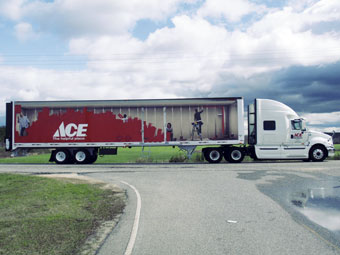 William J. Montanez knows a thing or two about the perils of shipping cargo. As director of risk management for Ace Hardware Corporation of Oak Brook, Ill., he has oversight of the retail-agency operations for the largest retailer-owned hardware cooperative in the industry.
William J. Montanez knows a thing or two about the perils of shipping cargo. As director of risk management for Ace Hardware Corporation of Oak Brook, Ill., he has oversight of the retail-agency operations for the largest retailer-owned hardware cooperative in the industry.
Montanez credits Ace Hardware's freight-shipping program with avoiding the types of cargo theft problems that other industries are seeing with identity theft, fictitious pick-ups and other scams. Part of the solution is maintaining its own transport team, which it augments with outside haulers when needed; the other half is knowing where its cargo is at all times—at least when it comes to domestic deliveries.
Ace boasts a private fleet of 400 tractors and some 1,200 dry freight trailers used to deliver to its 4,400 retail outlets in the U.S., from 14 domestic Retail Support Centers across the country. GPS and other electronic tracking technologies are used to monitor all of those shipments. “We have our own loss-prevention folks internally who monitor our distribution centers,” says Montanez. “We always know where a truck is.”
Recommended For You
Want to continue reading?
Become a Free PropertyCasualty360 Digital Reader
Your access to unlimited PropertyCasualty360 content isn’t changing.
Once you are an ALM digital member, you’ll receive:
- Breaking insurance news and analysis, on-site and via our newsletters and custom alerts
- Weekly Insurance Speak podcast featuring exclusive interviews with industry leaders
- Educational webcasts, white papers, and ebooks from industry thought leaders
- Critical converage of the employee benefits and financial advisory markets on our other ALM sites, BenefitsPRO and ThinkAdvisor
Already have an account? Sign In Now
© 2025 ALM Global, LLC, All Rights Reserved. Request academic re-use from www.copyright.com. All other uses, submit a request to [email protected]. For more information visit Asset & Logo Licensing.








